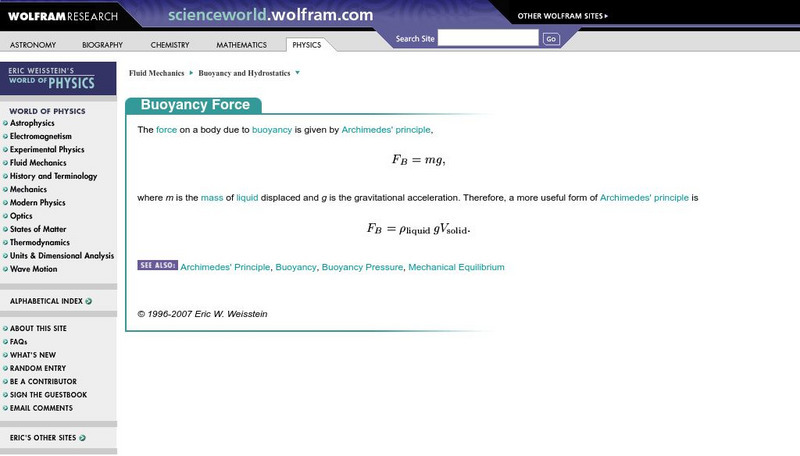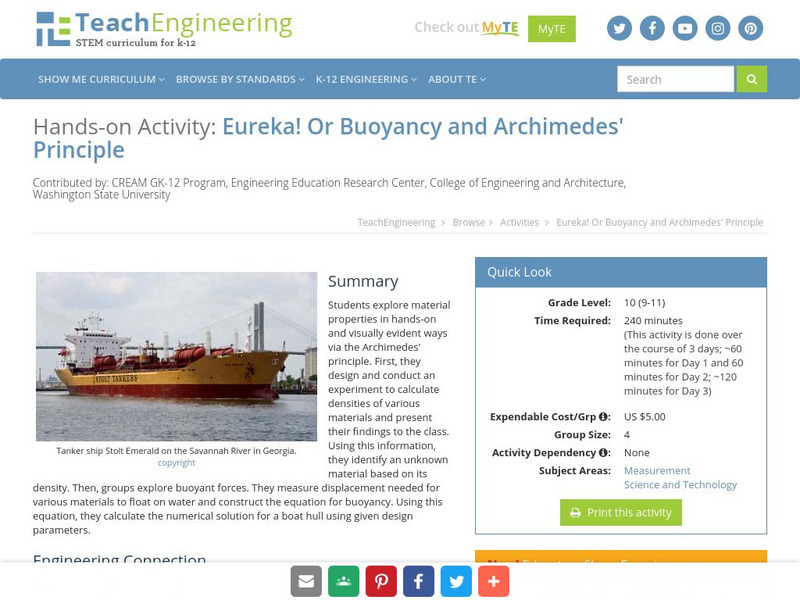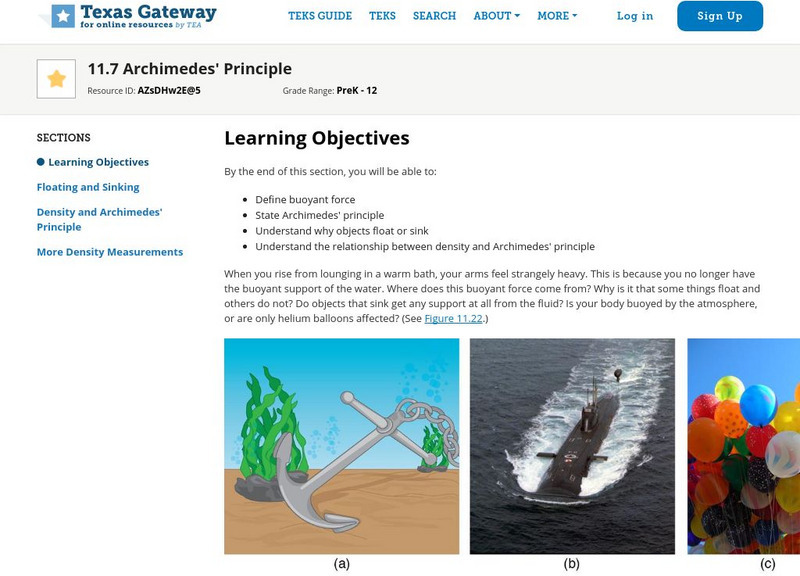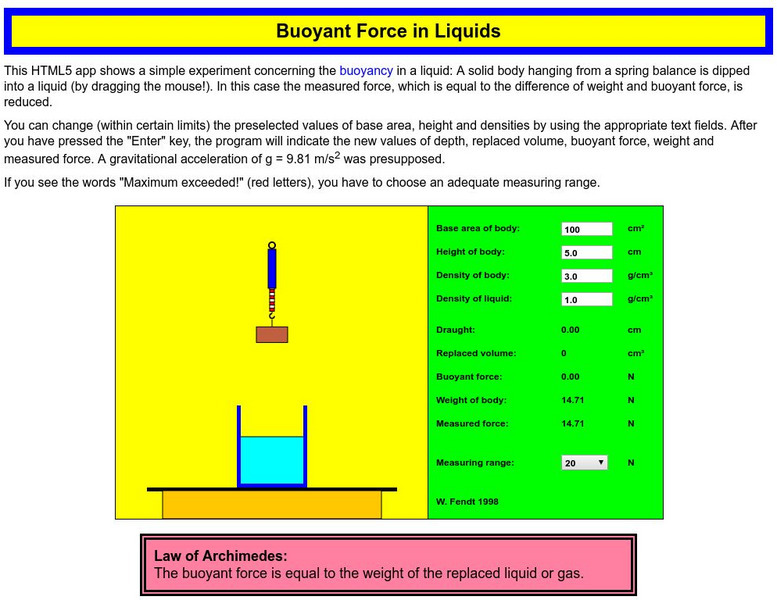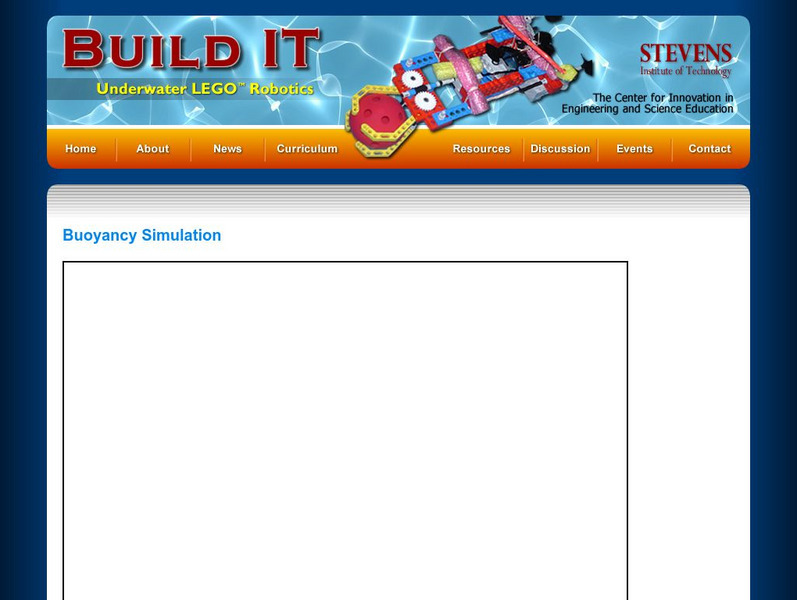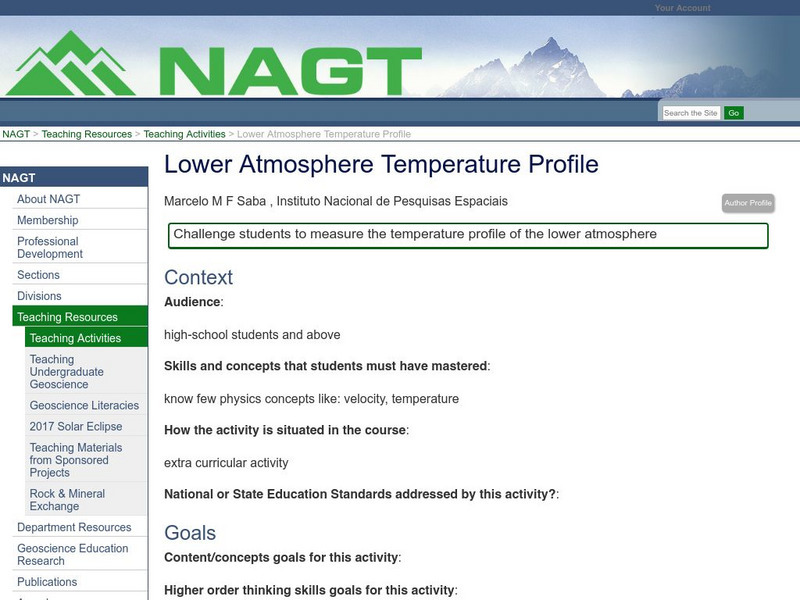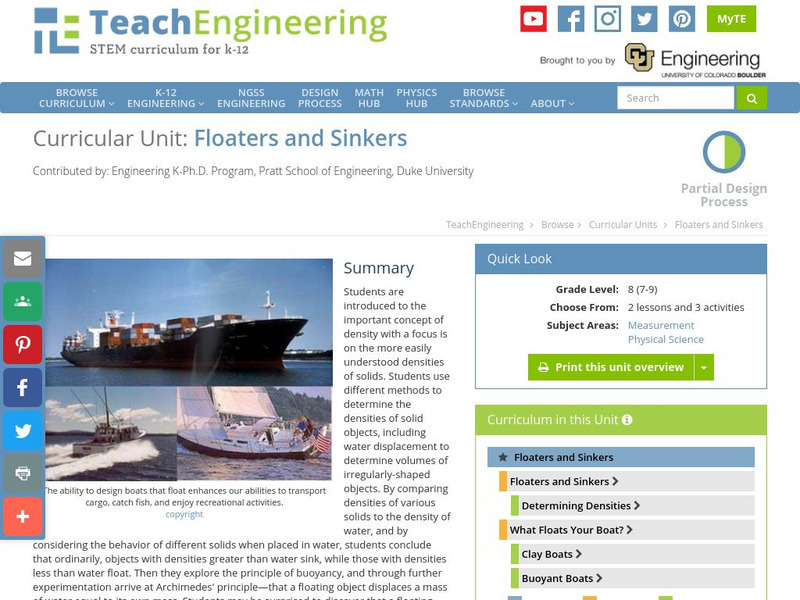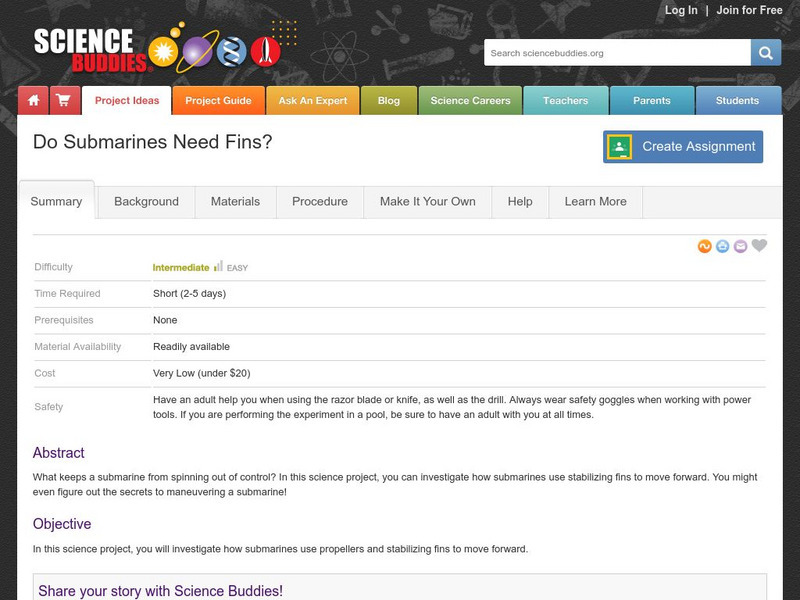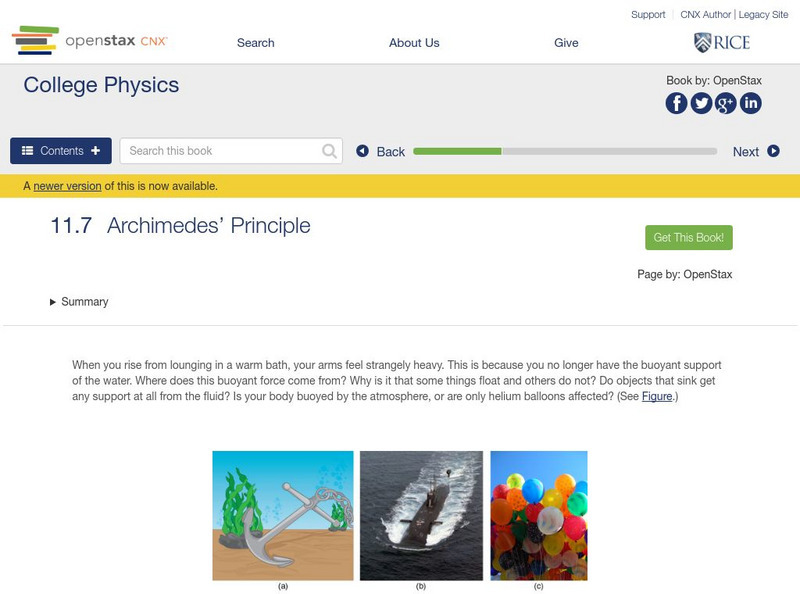Hi, what do you want to do?
Curated OER
Volumw Measurement, English System
Eighth graders biew each volume container and discuss where they have seen them in their home, and how they have seen them used. They explore the different names of volume sizes and their equivalents towards one another. Students...
Wolfram Research
Wolfram Science World: Buoyancy Force
This site provides a brief description and explanation of the buoyancy force. Content includes two formulas.
University of Colorado
University of Colorado: Ph Et Interactive Simulations: Buoyancy
An interactive simulation that teaches about buoyancy and density by applying various forces and modifying the properties of objects and fluids. This simulation can either be downloaded or played online and includes handouts, lesson...
CK-12 Foundation
Ck 12: Physics: Pressure and Force: Fluids Study Guide
Review and study pressure and force in regards to fluids.
Physics Aviary
Physics Aviary: Force Buoyancy Lab
This lab was designed to have students test the relationships that affect the force buoyancy. Not all things they change will be factors. They can change mass of bottle, volume of bottle, fluid type and planet.
Concord Consortium
The Concord Consortium: Molecular Workbench: Archimedes' Buoyancy Principle
Adjust the ratio of the masses of different particles to see how buoyancy is affected.
Other
Aquaholic: Buoyancy and Archimedes Principle
Description of buoyancy and a definition of Archimedes' Principle. Problems are presented and solved using Archimedes' Principle.
PBS
Pbs Learning Media: Buoyancy Brainteasers: Buoyancy Question
This interactive brainteaser from the NOVA: "Voyage of Doom" Web site challenges you to figure out what causes an object to sink.
TeachEngineering
Teach Engineering: Eureka! Or Buoyancy and Archimedes' Principle
Students explore material properties in hands-on and visually evident ways via the Archimedes' principle. First, they design and conduct an experiment to calculate densities of various materials and present their findings to the class....
CK-12 Foundation
Ck 12: Physical Science: Buoyancy
[Free Registration/Login may be required to access all resource tools.] Definition of buoyant force and how weight and density relate to buoyant force and the ability to float.
Massachusetts Institute of Technology
Mit: Open Course Ware: Buoyancy
Students explore buoyancy. Some topics examined in the activities are buoyant force, stability of floating objects, and Archimedes' principle. The resource consists of video clips, lecture notes, practice problems, and exam questions....
Texas Education Agency
Texas Gateway: Ap Physics: Fluid Statics: Archimedes' Principle
By the end of this section, you will be able to define buoyant force, state Archimedes' principle, understand why objects float or sink, and understand the relationship between density and Archimedes' principle.
Physics Aviary
Physics Aviary: Practice Problems: Force Buoyancy Problem
Students must figure out the number of people that can go on a raft without having the raft go fully under the fluid.
Science Education Resource Center at Carleton College
Serc: Investigating Buoyancy: Calculating the Maximum Load of a Ship
Students will use critical thinking skills to predict the maximum mass that a ship can hold without sinking. Students will then test their prediction by sailing their loaded ship.
Walter Fendt
Walter Fendt: Buoyant Force in Liquids
An app that demonstrates the Law of Archimedes. This virtual experiment will show students that by changing the shape of the solid, the amount of liquid displaced will change.
Center for Innovation in Engineering and Science Education, Stevens Institute of Technology
Stevens Institute of Technology: Buoyancy Simulation
By choosing the mass, size, and time, students can experiment with whether the block floats or sinks in this simulation. Students have the option to display the forces and add a second block to the tank. Density is also shown to allow...
PBS
Pbs Learning Media: Buoyancy Brainteasers: Boat in Pool Puzzler
This interactive brainteaser from the NOVA: "Voyage of Doom" Web site challenges you to figure out what happens to the water level when a rock is resting in a boat and when it is submerged in water.
TeachEngineering
Teach Engineering: Floating and Falling Flows
Students discover fluid dynamics related to buoyancy through experimentation and optional photography. Using one set of fluids, they make light fluids rise through denser fluids. Using another set, they make dense fluids sink through a...
National Association of Geoscience Teachers
Serc: Lower Atmosphere Temperature Profile
Young scholars are challenged to measure the temperature profile of the lower atmosphere. Experiment serves as an introduction to buoyancy, drag force, sensor calibration, and data plotting.
CK-12 Foundation
Ck 12 Exploration Series: Simulations: Physics: Scuba Training
[Free Registration/Login Required] A simulation to help you understand how a diver floats! Learn the principles of buoyancy and its relationship to the pressure gradient in a liquid in a gravitational field.
TeachEngineering
Teach Engineering: Floaters and Sinkers
Through this curricular unit, students are introduced to the important concept of density. The focus is on the more easily understood densities of solids, but students may also explore the densities of liquids and gases. Students devise...
Science Buddies
Science Buddies: Do Submarines Need Fins?
In this science project, you can investigate how submarines use stabilizing fins to move forward. Exploring friction and buoyant force you will get closer to understanding how these large ships function. Research resources are included...
OpenStax
Open Stax: Physics: Archimedes' Principle
From a chapter on Fluid Statics in a Physics textbook. This section of the chapter provides a detailed discussion of Archimedes' principle, buoyant force, floating and sinking, and the role of density. Includes questions, problems and...
PBS
Pbs Teachers: Scientific American: Beneath the Sea: Blowing Ballast
Explore the use of ballast to manipulate buoyancy in submarines by building a model of a submersible using two-liter bottles and balloons. Describe the balance of forces that is responsible for the surfacing and diving of submersibles.






